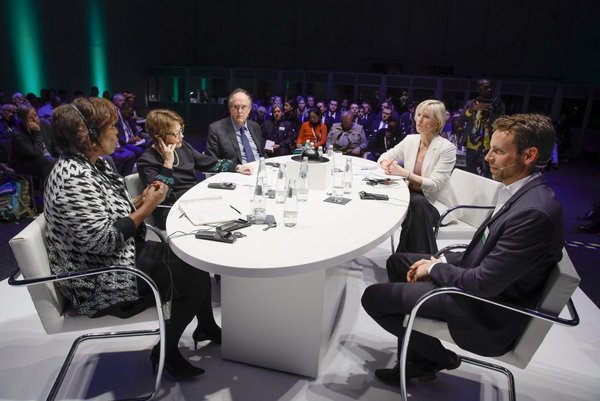- Share this article
- Subscribe to our newsletter
GFFA 2020 – trade for secure and sustainable nutrition
Globally, there are extreme differences in conditions for agricultural production. The impact of climate change and the rapidly growing world population are increasing the pressure on the scarce and unevenly distributed natural resources. How can trade balance this situation? And how does it have to be conceived to enable secure, diversified and sustainable nutrition for all people? These were focal issues at the 12th Global Forum for Food and Agriculture (GFFA), which was held in the context of the International Green Week in Berlin/Germany in mid-January 2020.
Under the guiding theme “Food for all – secure, diverse and sustainable”, around 2,000 representatives from politics, business, science and civil society discussed how trade could create a balance between regions with different food resources and thus contribute to the availability and security of diversified food.
GFFA Forum for agricultural policy dialogue
"Over the last twelve years, the GFFA has established itself as the agricultural policy dialogue in the international arena,” noted Uwe Feiler, Parliamentary State Secretary at the German Federal Ministry of Food and Agriculture, opening the three-day conference. Feiler referred to the example of the International Digital Council for Food and Agriculture presented by the United Nations Food and Agriculture Organization (FAO) during the Forum in Berlin. This Digital Council had been proposed by participants of the international conference of agriculture ministers at the previous GFFA 2019.
At the opening event in Berlin, Brazil’s Minister of Agriculture Tereza Cristina Corréa da Costa Dias defended her country’s agricultural policy, stressing that criticism of the increasing clear-cutting of the Amazon forests eclipsed the fact that the Amazon Basin consisted not only of rainforest but also of agricultural land sustaining the lives of around ten million smallholders. Securing their livelihoods and sufficient food supplies for them was one of the important goals of Brazilian agricultural policies. At the same time, the country had such vast areas of pastureland that extensive animal husbandry could be maintained that did not create excessive levels of CO2. The minister noted that beef was an important export product for the country.
When trade is mentioned, it is usually associated with global and supra-regional trade. However, Professor Joachim von Braun of the University of Bonn/Germany, noted at the opening event that developing inter-regional trade was just as important, e.g. within Africa, where the new African Continental Free Trade Agreement (AfCFTA) offered huge potential. However, von Braun emphasised that the countries of Africa urgently required new science-based technologies in order to raise their productivity while maintaining resource-friendly and sustainable agriculture. He warned against protectionism that was once again on the rise and was having a negative impact on the international trade flows and hence on agriculture, particularly in the countries of Africa.
Reconciling trade and sustainable agriculture
Ertharin Cousin, Distinguished Fellow at the Chicago Council on Global Affairs, gave a thought-provoking impulse by raising the important issue of whether it was realistic to maintain a balance between rising trade in agriculture and sustainable agriculture on condition of the conservation of natural resources and asking which technologies had to be provided to this end.
Cousin stressed that trade also created employment in rural regions. Here, it was important to distinguish between jobs in cash-crop production at agricultural locations of preference and those in food production, which frequently also existed in marginal areas. Integrating the usually small agricultural producers in the trade flows had to be one of the most important objectives of national agricultural policies, Cousin maintained.
Trade in food, i.e. importing high-quality agricultural produce, is of eminent importance to major retailers such as Germany’s supermarket chain Lidl. As Lidl Sales Manager Jan Bock explained, consumer demand came first, and what the consumer wanted was, for example, shelves containing agricultural products that were biologically certified and free of genetically modified organisms. Here, the certification of commercially traded produce indeed played an important role. While producers in Africa and Asia were sometimes charged high licence fees, these paid their way in the end, Bock maintained.
All participants in this GFFA opening event regarded creating harmony between stable trade in agriculture contributing to the prosperity of the local population and finding ways to develop sustainable and resource-friendly agricultural production as the prime objective of an international trade and development cooperation policy.
Angelika Wilcke, editor, Rural 21, Frankfurt/Main, Germany





Add a comment
Be the First to Comment